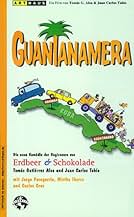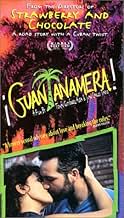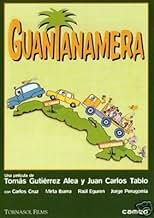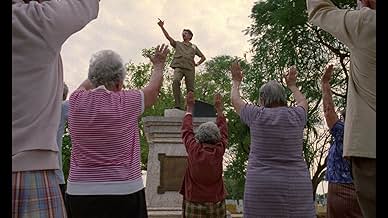Füge eine Handlung in deiner Sprache hinzuIt is a satire about life in Cuba. The members of a funeral procession and some truck drivers who need to take the same route begin to talk about God and the world and they end up discoverin... Alles lesenIt is a satire about life in Cuba. The members of a funeral procession and some truck drivers who need to take the same route begin to talk about God and the world and they end up discovering that life for both groups has many similarities and many differences, depending on the p... Alles lesenIt is a satire about life in Cuba. The members of a funeral procession and some truck drivers who need to take the same route begin to talk about God and the world and they end up discovering that life for both groups has many similarities and many differences, depending on the point of view.
- Regie
- Drehbuch
- Hauptbesetzung
- Auszeichnungen
- 7 Gewinne & 1 Nominierung insgesamt
- Marilis
- (as Louisa Pérez Nieto)
- Justo
- (as Jose Antonio Espinosa)
- Rivero
- (as Rubén Breñas)
Empfohlene Bewertungen
Obviously, we in the United States only get to hear about Cuba occasionally, so at the very least this movie should provide some insight into the state of affairs there (or just to hear the Cuban dialect, with its dropping of esses). But anything looking at people's individuals lives and how policies have affected them gets praise from me. We see how people have to abide by food rationing, among other things (of course, this is mainly due to the US blockade against the island). So I recommend this film.
In matters pertaining to birth, death and burial, people may not choose the place of birth or death, but they chose where they want to be buried. And this becomes a central issue in this road movie. It portrays the core values of a typical traditionalist Cuban family in a socialist country. It is for this reason that a dead body gets flown either out of state or country for burial. A song (Guantanamera), well spiced and crafted to fit each and every moment and character plays throughout the movie. This movie exposes the economics of a socialist run country. Road side vendors price their items in dollars. This suggests the instability of the national currency (possibly inflation).
When Gina puts on a new dress and let her hair run loose, it symbolizes self discovery and a sense of freedom. For the first time in this movie, she stands up to her husband and tells him that the days of subordination are over, she would not take off her dress. But also this could or symbolize people who live under a communist run regime, that there is limited freedom of choices. Those who are fed up of the system migrate, or export themselves to America through illegal means.
The directors did a great job in telling the general public about the flaws of a communist run country; corruption, dilapidating buildings and failed economy. Also the directors employed an excellent editing technique MONTAGE. Gina paces up and down and finally walks away from the funeral and finds comfort and love in Mariano. Both Gina and Mariano ecstatically share a smile and laughter whilst the funeral is still in procession. The MONTAGE suggests the anguish of people in Cuba go through in deserting their beloved country in search of freedom and better life.
Some snippets, though not central to the plot: How do government-run funeral homes work exactly, in a Communist country? Well, first, there is a per-person quota of refreshments for the bereaved and acquaintances who are paying last respects. But doesn't this attract inauthentic freeloaders? Second, there is a scene involving a meeting of regional mortuary-manager bureaucrats. If travel expenses for hearse trips are allocated according to the relative mileage of the territories through which vehicles traipse, the funeral home functionary in a crossroads region takes more than her share of budgetary hits. Is that fair? Third, there is the question of why the burial in Havana in the first place. If everybody and everywhere in Cuba are socialistically equal, what's wrong with the deceased staying put where she was? Meanwhile, we also have organized hitchhiking. Officials have the power to commandeer vacant seats from those who have for those who need.
There is some Latino romance, and some lightly subversive free enterprise. All in all, a likable movie. Mirta Ibarra, who starred twelve years earlier in Alea's 1983 film, Up To a Certain Point, gets an encore. She plays the niece of the deceased, who is also the wife of the over-serious Daniel Ortega-looking official who's in charge of the expedition.
Wusstest du schon
- WissenswertesFinal film directed by Tomás Gutiérrez Alea.
- VerbindungenReferenced in Die letzte Nacht (1998)
Top-Auswahl
- How long is Guantanamera?Powered by Alexa
Details
Box Office
- Bruttoertrag in den USA und Kanada
- 903.840 $
- Eröffnungswochenende in den USA und in Kanada
- 8.851 $
- 6. Juli 1997
- Weltweiter Bruttoertrag
- 903.840 $






















